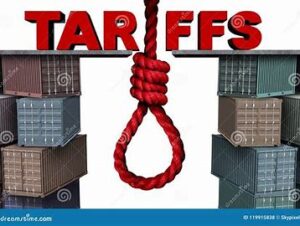Trump Tariffs Market Impact: What Traders Should Expect on Monday
President Donald Trump’s recent announcement of significant tariffs on imports from Canada, Mexico, and China is set to create ripple effects across financial markets. The Trump tariffs market impact is already visible in the futures markets, with U.S. stock index futures falling sharply.
The administration has imposed a 25% tariff on imports from Canada and Mexico, along with a 10% tariff on Canadian energy resources and select Chinese goods. These measures are expected to trigger volatility as markets open on Monday. (White House)
Immediate Market Reactions
In response to the tariffs, stock market futures took a hit. Dow futures dropped by 1.5%, with similar declines seen in the S&P 500 and Nasdaq 100. Asian markets, particularly the Nikkei 225, and South Korean equities, also showed sharp downturns. Bitcoin, often considered a hedge against market uncertainty, saw a drop to $93,900. (MarketWatch)
The Trump tariffs market impact is also being felt in currency markets. The U.S. dollar surged over 1%, negatively affecting the Canadian dollar, Mexican peso, and euro. The stronger dollar could put additional pressure on multinational corporations that rely on exports. (Financial Times)
Anticipated Market Impact on Monday
As the markets open, traders should expect heightened volatility and sector-specific consequences from the Trump tariffs market impact:
- Energy Sector: The 10% tariff on Canadian energy resources could increase costs for U.S. refiners, leading to potential price hikes for gasoline and oil products. This will directly impact energy stocks and transportation-related businesses. (MarketWatch)
- Consumer Goods: The tariffs on Mexican and Chinese imports could push up prices for electronics, automobiles, and agricultural products. Companies that rely on these imports may see lower profit margins due to rising costs. (New York Post)
- Inflation Concerns: Economists warn that the Trump tariffs market impact could contribute to higher inflation in the U.S., making borrowing more expensive and putting pressure on the Federal Reserve’s monetary policy. (Financial Times)
Strategic Considerations for Traders
Given the uncertainty surrounding the Trump tariffs market impact, traders should consider the following strategies:
- Monitor Key Economic Indicators: Keep an eye on inflation reports, consumer spending data, and corporate earnings releases to gauge how businesses and consumers are reacting to the tariffs.
- Diversify Portfolios: To mitigate sector-specific risks, traders should look at safe-haven assets such as gold, defensive stocks, or ETFs that are less affected by tariff-related volatility.
- Stay Informed: Markets are highly reactive to policy changes. Traders should follow financial news updates from reputable sources to track ongoing developments regarding the Trump tariffs market impact.
Conclusion
The Trump tariffs market impact is expected to create significant volatility in equities, futures, and currency markets. While some sectors may benefit, others—particularly energy, manufacturing, and consumer goods—are likely to experience disruptions. As traders prepare for Monday’s opening bell, staying strategic, informed, and adaptive will be key to navigating these turbulent conditions.
Good Trading,
Adrian Manz
Links to related articles on TraderInsight.com

